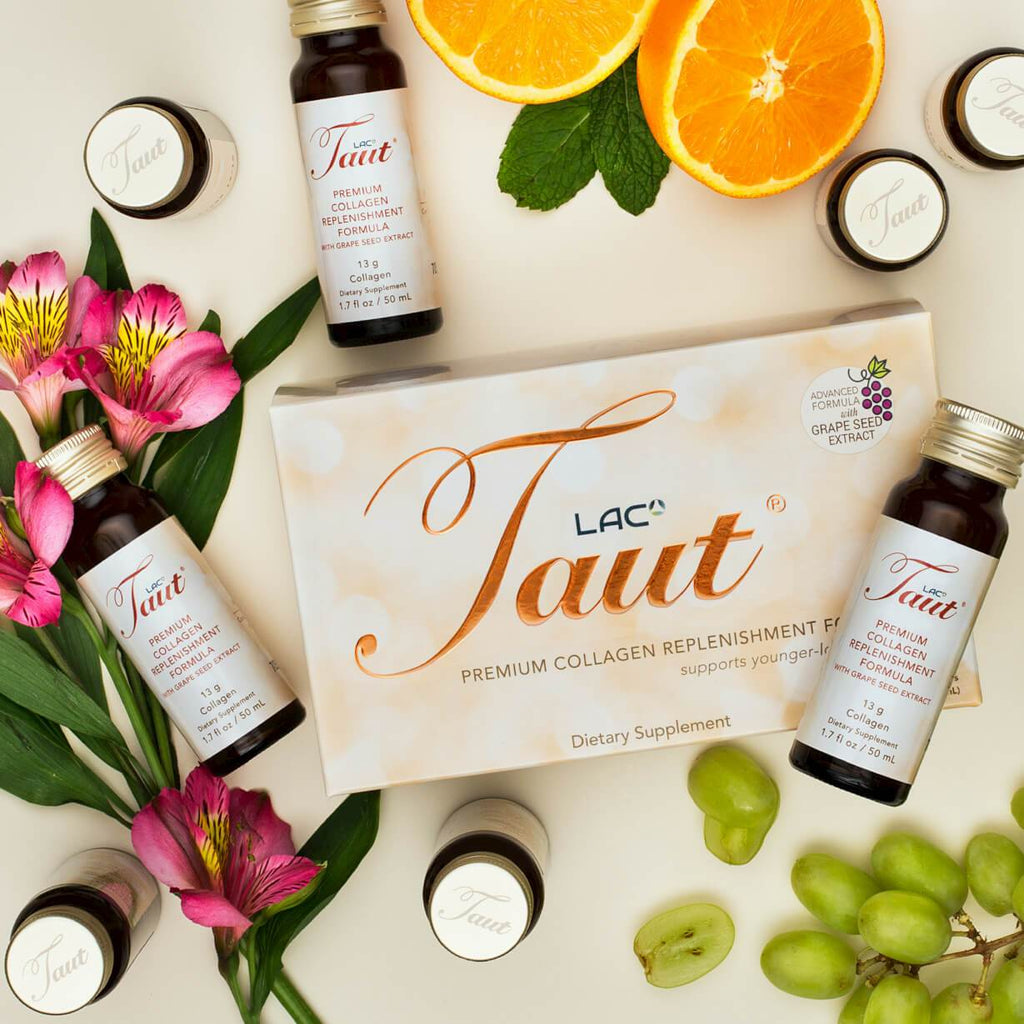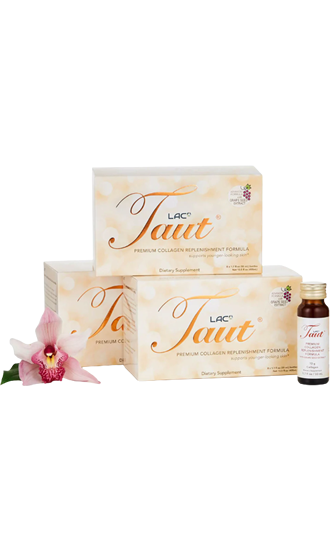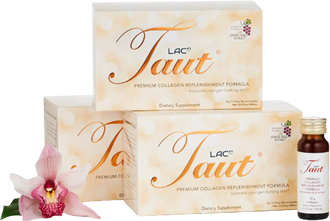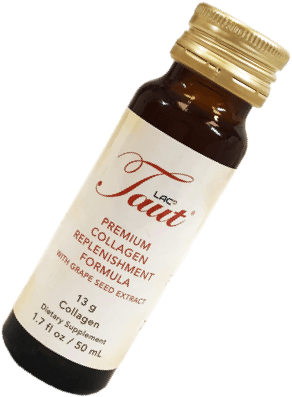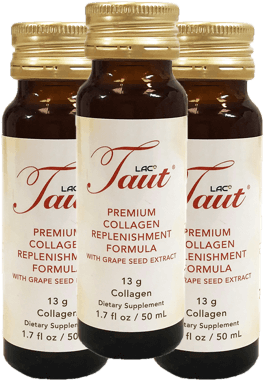How Much Collagen Per Day & How Many Mg Should You Take Daily?

Collagen is a jack of all trades; It’s good at almost everything! From keeping our skin plump and youthful to protecting our joints and improving our gut health. Is there anything collagen can’t do?
But, between all of the celebrity endorsements and wellness blogs touting the benefits of collagen, figuring out just how much collagen per day you should take can be a challenge.
Collagen, in particular, is a difficult supplement for many people to get right simply because the amount you should take can depend on a variety of lifestyle, diet, and health factors.
Besides your own background, your daily dose is also dependent on the type of collagen supplement that you’re taking. And, the number of grams of collagen that you should take also depends on the skin and health benefits that you’re expecting to see.
If you’ve started taking a collagen supplement, you may be shocked to learn that getting enough collagen to reach your goals (yes, even if you’re following the directions on the back of the bottle).
So, how much collagen should you take every day and what kinds of supplements should you be taking? Keep reading as we answer these questions and more so you can get back to feeling the best, most youthful version of yourself.
More helpful reading: What are the top 10 skin care products?
What Is Collagen?
Before you find out the answer to the question “How much collagen should you take a day?”, you might be curious to find out what collagen actually is.
You can think of collagen as the glue that holds us together. It makes up nearly a third of all of the proteins in our body, making it by far the most abundant protein.
Collagen is a structural protein found in our organs, eyes, bones, blood vessels, and connective tissue, like our skin, muscles, and tendons. Yes, you can find collagen in practically every nook and cranny of the body.
Collagen naturally gives strength, durability, and stability to everything that it is a part of. It also plays an important role in supporting the nervous system and wound healing. You see, collagen is much more than an emerging trend, it’s an integral part of a healthy body.
More helpful reading: best collagen drinks for skin
How Does the Body Make Collagen?
Our body doesn’t actually need collagen supplements to make collagen on its own. In fact, the body makes collagen proteins, just like it makes any other proteins. However, this abundant protein is not a complete protein, meaning that it does not contain all nine essential amino acids that your typical protein molecule does. Collagen only contains 3 essential amino acids: Glycine, proline, and hydroxyproline.
In order to synthesize collagen, our cells must break down the protein that we have eaten (otherwise known as “dietary protein”) into essential amino acids. This is one of the many reasons why it’s so important to squeeze plenty of protein into your diet. Learn more about keto & skin.
As you can probably tell, you don’t need to consume collagen to get the amino acids you need to make collagen, especially if you eat a balanced diet that includes protein from animal sources and other foods that support collagen synthesis.
However, while dietary protein is important for maintaining our normal collagen levels, collagen supplements are what give collagen production a natural boost to replace collagen that we’ve lost and prevent typical signs of aging from setting in.
More helpful reading: Does collagen help hair growth
7 Reasons for Collagen Loss
If our body produces collagen on its own, why do we need to worry about collagen supplementation? The problem is, as we get older, our collagen levels decrease. This wouldn’t be an issue, however, around the same time, the amount of collagen that we produce naturally also starts to take a dip.
While collagen naturally degrades over time, other factors can play a part in how quickly or slowly we lose this essential protein. Unfortunately, not all of these factors are within our control. These are the top 7 major contributors to collagen loss:
1. Age
As we mentioned above, the older we get, the less collagen we have. That means, when we’re young and spry, so is our collagen production. This is why babies have such plump and bouncy skin; the rate at which they produce collagen is much faster than the rate at which they lose it.
By the time we reach our early 20s, our collagen production starts to decline about 1% every year. For women, collagen gets depleted even faster during and after menopause. It’s about time we stop getting old! 2, 3
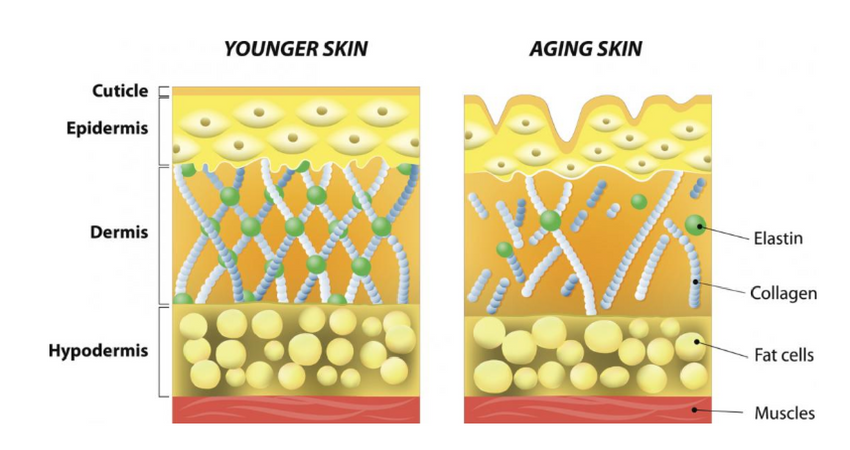
2. Smoking
It should come as no surprise that smoking is not good for us and it’s especially not good for our skin. One of the biggest reasons why smoking causes us to age prematurely is because of how it can affect our collagen.
By smoking, we decrease the amount of oxygen that gets delivered to our skin. Consequently, our skin is not able to regenerate new collagen, which can speed up collagen loss. Research has shown that smokers have less collagen production than non-smokers. 4, 5
Besides preventing our body from delivering sufficient oxygen to the skin and other tissues that need it to run smoothly, tobacco smoke also contains chemicals that can cause oxidative stress. Oxidative stress—caused by excess free radicals—can lead to more wrinkles, fine lines, and crow’s feet. Trust us, there’s no better day than today to squash this habit.
3. Sun Exposure
Laying out in the sun can be a nice way to spend a relaxing afternoon at the beach, but it also can put you on the fast track to collagen loss. And, if you’ve ever gotten a sunburn, you may have noticed your skin become red and inflamed. That’s your body telling you that most of the damage to your skin cells has been done.
According to the Skin Cancer Foundation, UV exposure is responsible for up to 90% of changes in the skin, including age spots, sagging, fine lines, and wrinkles. 6
First and foremost, exposure to UV rays from sunlight can cause our collagen fibers to break down at an accelerated rate. In fact, sun-exposed skin can have up to 20% less collagen than skin that was not exposed to the sun.
If that weren’t enough, radiation from UV rays can lead to an overabundance of free radicals, also known as oxidative stress. Oxidative stress can cause an increase in wrinkles, dark spots, and uneven skin.
While there are plenty of actions you can take to defend your skin from the sun’s rays—like applying sunscreen, wearing protective clothing, and staying out of the sun—there are only a few ways that you can reverse the effects of the sun on your skin. One of the best ways to mitigate the effects of the sun is by taking an antioxidant-packed supplement, like Taut Bright.
This skin lightening supplement contains 7 powerful antioxidants and active ingredients, including L-glutathione also known as the “Mother of all antioxidants,” vitamin C, and alpha-lipoic acid. These ingredients have been proven by science to protect the body from cellular damage, prevent melanin production, and fade hyperpigmentation so you can flaunt naturally more radiant and flawless skin all year long.
More helpful reading:
https://www.renewskinco.com/blogs/i/summer-skin-care-tips
4. Stress
Chronic stress can take a toll on your whole body, including your skin. It can cause your complexion to look worn out, dull, and older than it really is.
Whether stress is caused by an upcoming work deadline or relationship tension, ultimately, all of the negative effects of stress can be boiled down to your body’s natural fight-or-flight response, or acute stress response.
So, what happens when our body goes into fight-or-flight mode? Your body releases hormones that activate your sympathetic nervous system. As a result, your blood pressure, heart rate, and breathing rate all increase.
In order to support your body’s natural response, your blood flow is directed to the organs that are working extra hard to keep you alive (your heart, brain, and lungs) and away from your skin. Don’t be alarmed, feeling temporarily stressed is completely normal. And while less blood flow to your skin can cause you to look pale, tired, and dull, it won’t cause too much damage to your skin in the long run. However, when stress becomes a recurring issue, a lack of sufficient blood flow to your skin can inhibit its ability to produce collagen.
Stress can also be an invitation for free radicals to take up residence in your body, which can also contribute to premature aging and lower collagen levels. 7
More helpful reading: Sunday scaries
5. Sleep
Beauty sleep isn’t just for Disney princesses. While it may sound like a myth, there is some truth to the concept of getting “beauty sleep.”
This is because our skin and body go through their repair processes while we’re asleep. As we snooze, the body produces growth hormones that encourage the production of new cells. At the same time, the body boosts collagen production within our skin, muscles, bones, and everywhere else the most abundant protein in our body can be found.
You can probably see how not getting enough sleep can be damaging to the body. If you’ve ever noticed that your skin looks dull and lackluster after a night of restless sleep, you’ve seen firsthand just how important it is to catch some Zzzz’s. What is a free radical? RenewSkin Inc. explains.
Over time, a chronic lack of sleep, or sleep deprivation, can result in high levels of stress. In fact, getting only 5 hours of sleep per night may leave you with two times more wrinkles than getting 7 hours of deep, restful sleep would. There you have it, one more reason to hit the snooze button!
More helpful reading: Sleep and beauty by RenewSkin Inc.
6. Diet
Can a croissant make you look older than you actually are? Possibly! Treating yourself to the occasional sugary delight may feel harmless in the moment (and taste delicious), but over time, high-glycemic foods can lead to serious collagen damage. Learn more about good sugar and bad sugar from RenewSkin Inc.
High blood sugar levels caused by eating foods with a high glycemic index can lead to glycation, a process that occurs when there is an abundance of glucose in the skin. During glycation, free radicals called advanced glycation end-products, otherwise known as AGEs, are formed.
How can AGEs age you? These little free radicals attach themselves to the collagen and elastin in your skin, and attack the proteins that keep your complexion looking youthful. As a result, you may notice less skin elasticity, and more thinning and wrinkling skin. How do wrinkles form? RenewSkin Inc. explains.
Does this mean that you should no longer save room for dessert? Not necessarily. It’s completely up to you which dietary changes you want to make for healthier skin.
More helpful reading:
https://www.renewskinco.com/blogs/i/is-sugar-bad-for-your-skin
7. Genetics
One of the least controllable reasons why we lose collagen is our genetics. Unfortunately—or fortunately, for those lucky ones—our genetics determine how much collagen our body is able to produce and at what rate we lose collagen. So, if your family has good-looking skin well into old age, you will likely have a similar fate.
What Are the Benefits of Taking Collagen Peptides?
It’s hard to believe that people still wonder whether the benefits of collagen are fact or fiction. Since collagen is present in almost all of our connective tissues, bones, and organs, supplementing with collagen can have a huge impact on how we look and feel. Need more proof? We’ve made a list of the top 5 benefits of taking collagen peptides:
1. Supports Hydrated, Healthy, Younger-Looking Skin
If there’s one supplement that can put the breaks on aging skin, it’s collagen. Collagen makes up 70% of the dermis, which is the thickest layer of our skin. Research has shown that collagen supplements can help reduce wrinkles, fine lines, dryness, and improve skin elasticity.
The right collagen supplements not only provide your skin with collagen proteins, but also trigger your skin’s fibroblasts to increase collagen production on their own.
And, supplementing with collagen has been shown to improve the wound-healing properties within our skin, minimizing the appearance of acne scars, stretch marks, and other skin imperfections.
More helpful reading by: Skin plumping
2. Improves Joint & Bone Health
As we get older, we know we should expect a few more aches and pains. We can blame the diminishing cartilage in our joints for much of this discomfort. By supplementing with collagen, we can support the existing cartilage and slow down the rate at which our cartilage deteriorates.
One study showed that taking undenatured collagen supplements for 180 days improved joint stiffness and the overall function of joints in 191 participants.
More helpful reading by RenewSkin Inc.: Is collagen good for men?
3. Contributes to Muscle Growth & Function
Reach your gym goals a little bit faster by supplementing with collagen. Research has shown that collagen supplementation can help improve or preserve lean muscle mass. We can thank two of the three amino acids in collagen for their muscle-enhancing benefits: Glycine and arginine.
These two amino acids help our body synthesize creatine, the amino acid in our muscles that produces energy.
4. Improves Hair & Nails
Healthy hair and nails both have one protein in common: Collagen.
While our hair isn’t made up of collagen, it does make up 95% of keratin, the protein that makes our hair strong and durable. Collagen is also an essential component of our scalp. It supports our hair follicles during the anagen phase, the phase of the hair growth cycle when the hair actually grows. Having high levels of collagen during this phase is crucial because, during the catagen phase, our hair follicles lose two layers of collagen.
Collagen also plays a role in the health of our nails. Research has shown that supplementing with collagen can accelerate nail growth by 12% and decrease the occurrence of broken nails by 42%. Participants from this study also noticed stronger, less brittle nails. Collagen is truly a natural beauty enhancer! 17
More helpful reading:
https://www.renewskinco.com/blogs/i/collagen-role-for-healthy-hair-and-nails
5. Ensures Better Digestion
Recent studies have shown that collagen supplements may improve gut health. A few of the amino acids that are found in collagen can also be found in the connective tissue of your digestive tract.
Having a strong digestive tract can help prevent or improve certain gut issues, including gut inflammation and “leaky gut.” Leaky gut is a result of damage to the lining of your intestine, which causes particles from your intestine to enter the bloodstream. Left untreated, leaky gut can lead to inflammation of the skin and body.

What Are the Different Types Of Collagen?
There’s way more to collagen than what meets the eye. In fact, there are 28 different types of collagen in the body. The main types of collagen are types I, II, III, IV, and V. These five types of collagen are the most abundant in our skin, connective tissues, bones, and organs, with types I and III being the most common.
If you’ve seen different health benefits advertised on the labels of collagen supplements; while some are meant for skin health, others are intended for joint health. These benefits can all be attributed to the type of collagen that is in the supplement. The majority of collagen supplements contain type I collagen because it is the most abundant form found in your skin, joints, bones, and connective tissues.
Below, we’ve explained a few of the different functions of the most common types of collagen:
Type I
Out of all of the different types of collagen in the human body, type I is the most widely found throughout the body. It makes up 90% of the total collagen you have in your body. You can find type I collagen in your bones, blood vessels, connective tissue, skin, hair, and nails. It consists of tightly packed collagen fibers, making it the strongest form of collagen in the body.

Type II
One of the most essential types of collagen for joint health is type II. You can think of type 2 collagen as a cushion that protects the ends of our bones from damage. It can also be found in your rib cage, nose, ears, and bronchial tubes.
Type III
Type III collagen is an integral part of healthy skin and organs. Similar to type I, you can find type III collagen in your skin, blood vessels, hair, nails, and connective tissue. You can also find type III along with type I in your liver and bone marrow.
Type IV
Type IV helps create new blood vessels throughout your body and can also be found in the lens of your eye. While it can be found in the skin, it does not play a large part in the structure and appearance of your dermis. Instead, this type of collagen helps with filtration because it consists of looser collagen fibers.
Type V
Type V is essential as far as creating scar tissue in the skin, which means it plays a big role in wound-healing. Its wound-healing properties are useful when the skin needs to repair itself after a cut or a scrape, or from imperfections, like acne and blemishes. Out of all of the different types of collagen, this type is the least commonly found. Learn more about types of skin blemishes from RenewSkin Inc.
How Much Collagen Should You Take Daily? (Collagen Dosage Per Day)
Now that you know the different factors that contribute to collagen loss, you’re probably still wondering, “How much collagen should I take a day?”.
The truth is, there aren’t any guidelines that tell us how much collagen to take daily. Similar to other supplements, the amount that you need will depend on factors like the type of collagen you’re taking, and the benefits you’re looking for. However, the jury is still out on how much collagen you actually need, since oral supplementation with collagen peptides is still a “newer” practice.
In fact, research on collagen can be dated back to the 1940s, but clinical studies on collagen peptides only really started in the last 20 years. Basically, we’re still in the process of understanding what the daily recommended amount of collagen should be.
Collagen dosage is not “one size fits all.” When figuring out your recommended daily collagen intake amount, you have to take into consideration how fast your body is losing collagen. As we mentioned above, some of the factors that can cause collagen loss are age, UV exposure, diet, lifestyle, and genetics. If you believe that your body is breaking down collagen faster than it’s able to replenish it, you may want to adjust how much collagen you take every day.
Finally, it’s important to note that not all collagen supplements are created equal. The number of collagen peptides that each supplement contains can vary from a few milligrams to around 20 grams. If the collagen content of a supplement is low, you would likely need to take far more than the recommended amount in order to see any health benefits (with permission from your healthcare provider, of course). To avoid this issue, always check the collagen content, or concentration, on the product’s label or website before taking collagen supplements.
More helpful reading: HHow long does collagen take to work?
Collagen Dosage for Each Benefit
There’s no point in taking a supplement if you’re not going to see results. When it comes to supplementing with collagen, not only do the different types of collagen matter but the amount of collagen (in grams) can play a part. It can be the difference between a holy-grail product and flat-out waste of money.
We would love to tell you how much collagen you need to take in order to see the health benefits you’re looking for—but we can’t. What we can tell you is what research has shown to be effective as far as seeing benefits in joint, bone, muscle, and skin health.
Neither we nor researchers have an exact recommendation for the amount of collagen you should consume every day. However, based on the benefits you’re looking for, there may be a specific dosage amount that is right for you. Below, we’ll go into detail about the different benefits and how much collagen you should take to start seeing results based on clinical research and trials.
How Much Collagen Should You Take for Joint Health?
How much collagen should you take daily to improve your bone and joint health? According to a few studies, you should take between 2.5 to 10 grams of collagen per day. One study looked at the impact on collagen intake in patients with chronic Achilles tendinopathy and found that supplementing with 2.5 grams of collagen bi-daily and calf-strengthening exercises could significantly reduce joint pain. 8
Additionally, research has shown that taking collagen supplements containing 10g of collagen can help reduce joint pain in athletes in just 24 weeks. 9
How Much Collagen Should You Take for Bone Health?
How much collagen can you take a day to improve bone density and health? Research has shown that the sweet spot is around 5 grams of collagen. One study showed that taking 5 grams of collagen per day could help improve bone density and bone markers in women who were post-menopausal. 10
How Much Collagen Should You Take for Muscle Mass & Muscle Growth?
How much collagen in a day do you need to support muscle mass and muscle growth? Overall, research suggests that 15 to 20 grams of collagen should be enough. One study, which followed elderly subjects, found that taking collagen supplements with 15 grams of collagen along with regular resistance training could help increase muscle mass and muscle strength. Another study, that followed 77 premenopausal women, showed that taking a collagen supplement with 15 grams of collagen could help improve muscle mass and strength when coupled with resistance exercise. 11, 12
Not only can taking collagen supplements help build muscle mass and improve muscle growth, but they may also help lessen soreness after a workout. One randomized, controlled trial showed that taking 20 grams of collagen every day helped minimize muscle soreness and inflammation. Just call collagen supplements a Crossfitter’s best friend. 13

How Much Collagen Should You Take for Skin Health?
To diminish and reverse visible signs of aging, the concentration of your collagen supplement is important. Several clinical studies show that taking a high concentration of collagen peptides can help improve the appearance of fine lines, wrinkles, sagging skin, stretch marks, and other skin imperfections. Can you get rid of stretch marks? RenewSkin Inc. explains.
One study showed that just 2.5 grams of collagen peptides improved skin hydration, skin elasticity, density, and roughness in 72 healthy women over the age of 35. Another study on the effects of collagen on the skin showed that people who take a collagen supplement containing anywhere from 2.5 to 5 grams of collagen could experience less dry skin and have an increase in skin elasticity. 14, 15
Research from several studies has also shown that taking 10 grams of collagen per day can drastically improve skin hydration and reduce the effects of skin aging. While not all collagen supplements offer such a high concentration, Taut Premium Collagen Advanced Formula Drink stands out among the rest. This collagen peptide supplement contains 13 grams of collagen peptides (90% Type I and 10% Type III), which is the highest amount of hydrolyzed collagen peptides per serving currently available on the market.
Taut Collagen is made with 100% pure marine fish collagen harvested from wild-caught red snapper from the Indian Ocean and enhanced with marine and plant-based antioxidants. The orange-flavored formula is completely preservative-free, gluten-free, and sweetened with stevia.
The revolutionary patented hydrolysis technology used to make Taut’s unique formula breaks down the necessary collagen proteins into tiny peptides that are small enough to be easily and effectively absorbed by the body. As a result, when you drink a bottle of Taut Collagen, the high percentage of nano-sized collagen peptides enter your bloodstream, trigger your body’s natural wound-healing response, and encourage collagen production.
Besides the high concentration of collagen, ingredients like elastin, grape seed extract, vitamin C, hyaluronic acid, and ceramides all enhance and support skin elasticity, hydration, and protect the dermis from free radical damage and hyperpigmentation to deliver maximum skin rejuvenation and radiance with every sip. Think of it as collagen injections, without the needles.
So, how much collagen should you take a day to see visible results in your skin? We recommend that first-time users consume 1 bottle of Taut Collagen every day for the first 21 days to boost collagen production throughout your body. After the initial 3 week period, you should start to notice smoother, fuller, and more radiant skin, but how soon you see results will depend on your age, lifestyle, and current condition of your skin.
You can continue taking Taut Collagen every day or transition to drinking one bottle every other day there are no known side effects associated with long-term consumption.
Note: While you may be able to find vegan, plant collagen supplements on the market, collagen proteins do not naturally exist in plants. Instead, vegan collagen is a genetically modified (GMO) product. It’s made by adding human genes to yeast and bacteria which then synthesize the amino acids of human collagen.
So, how much vegan collagen should you take per day? Considering that there isn’t much research into the effects of taking vegan collagen, we can’t definitively answer how much you should be taking. It’s best to follow the recommended dosage on the back of the bottle.
How Long Will It Take to See Results?
When we start taking a new supplement, we may feel anxious and excited to see the skin and health benefits start to kick in. Depending on the results you’re looking for, you could end up waiting 24 weeks or more to finally see improvements.
Of course, individual experiences can vary based on health, lifestyle, and genetics. The type of collagen supplement you’re taking can also influence when you start seeing results. But, as the old saying goes, “Good things come to those who wait.”
The most recent research suggests the following time periods for beauty, health, and wellness benefits:
- Tendon and muscle health: 3 to 6 months
- Skin health: 3 to 12 weeks
- Nail health: 6 months
- Joint health: 4 to 6 months
- Bone health: 12 months

How Many Mg of Collagen Per Day Is Too Much?
Collagen is considered a safe, nontoxic daily supplement, which is why there’s no standardized limit as to how much collagen you can take on a daily basis.
While there is no such thing as too much collagen, since consuming collagen peptides is not associated with extremely negative side effects, some people who take high doses of collagen have reported gastrointestinal difficulties, such as nausea, stomach pain, and excess gas. That’s why it’s best to follow the directions according to the specific collagen supplement that you’re taking.
Can Too Much Collagen Cause Weight Gain?
No, taking collagen will not make you gain weight.
In fact, certain types of collagen can cause your body composition to change for the better. A few studies have shown that by taking collagen peptides, participants were able to preserve or increase their muscle mass. And, higher muscle mass percentages have been associated with lower body fat percentages.
Related: How can I lose weight? RenewSkin Inc. explains
Different Types of Collagen Supplements (Gelatin, Hydrolyzed, & Undenatured Collagen)
There are several different types of collagen supplements on the market, some more effective than others. Before you start taking collagen, you’ll want to know what type of collagen the supplement contains. Most collagen supplements provide type I collagen since it is the most abundant type in the body. But, depending on the intended use of the supplement—whether it be intended for skin health, joint health, or bone loss prevention—it may also contain types II, III, IV, and V.
Additionally, you’ll also want to know the source of the collagen protein. The most common sources of collagen are bovine, porcine, and marine. Marine collagen, which is sourced from the bones, skin, and scales of fish, is regarded as the safest and most effective form of collagen. Learn more about marine collagen peptides benefits here.
The three different types of collagen that you can find in collagen supplements are gelatin, undenatured collagen (derived from chicken cartilage), and hydrolyzed collagen. Let’s take a look at these three types of collagen:
1. Undenatured Collagen
Undenatured collagen is the rawest form of collagen which is harvested from chicken cartilage. Several studies have suggested that taking undenatured collagen derived from chicken cartilage can improve joint health. Several studies have shown that taking an undenatured collagen supplement can help improve joint health.
If you’re shopping for an undenatured collagen supplement, you may see it labeled as “UC-II”.
2. Gelatin
Who knew we were getting our daily dose of collagen by the spoonful when we were younger? Gelatin, the ingredient that gives Jell-O its iconic jiggle, is one form of collagen that is often overlooked.
Similar to undenatured collagen and hydrolyzed collagen, gelatin is made from animal sources. Gelatin is derived by boiling the skin, connective tissue, and bones of cattle, pigs, or poultry. Unlike denatured collagen and hydrolyzed collagen, gelatin isn’t typically used as a collagen supplement. Instead, it’s used as an ingredient to add to foods like soups, sauces, and desserts. But, don’t be fooled, you can get a boost of collagen from foods made with gelatin.
3. Hydrolyzed Collagen
Also known as collagen hydrolysate, hydrolyzed collagen describes pure collagen that has gone through the hydrolysis process. This process is what breaks the collagen molecule into smaller, more bioavailable amino acids, known as collagen peptides. Most collagen supplements contain hydrolyzed collagen since the smaller-sized amino acids are essentially pre-digested and more easily absorbed by the body. This type of collagen can be harvested from animal sources like poultry, cows, fish, shellfish, and pigs.
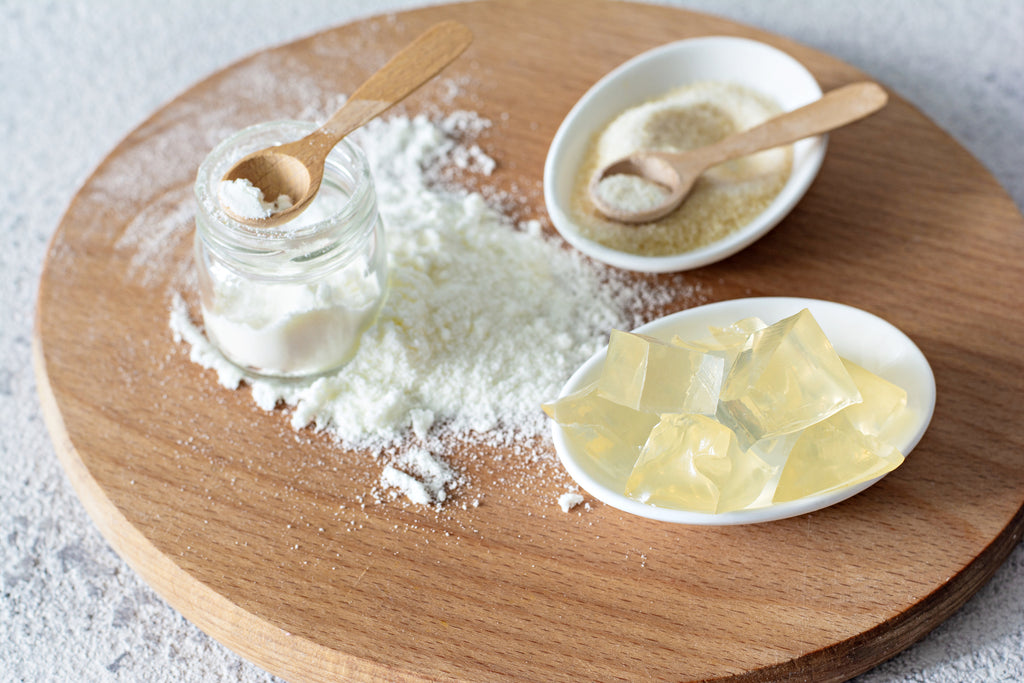
More helpful reading:
Quality of Your Collagen Supplement
Before taking a collagen supplement, it’s important to research the quality and purity of its source.
Since collagen supplements are made from animal sources, such as chicken, bovine, or porcine, consumers should be aware that some sources will be better than others. Because collagen supplements are not approved by the FDA, they are not closely monitored for safety. This means that they can contain contaminants such as antibiotics and diseases, like bovine spongiform encephalopathy (BSE), or “mad cow disease.” So, if you’re planning on taking a chicken, porcine, or beef collagen, make sure that it comes from a certified grass-fed, free-range, and 100% organic source.
To avoid contaminants and diseases altogether, you can opt for a marine collagen supplement that contains collagen extracted from wild-caught fish, as is the case with Taut Collagen.
However, if you have experienced allergic reactions after eating seafood in the past, it’s best to avoid collagen supplements made from marine sources.
Different Forms of Collagen Supplements
As you decide which supplement to take, remember that taking a collagen supplement shouldn’t feel like a chore. A collagen supplement should work well with your diet and lifestyle. Apart from getting enough collagen to meet your skin, wellness, and health goals, the most effective type of collagen supplement will be one that you take regularly.
When shopping for collagen supplements, there is no lack of options. And, choosing the best supplement is no walk in the park. Besides having to calculate the collagen content per serving of each product, it can be difficult to decide whether to take a collagen pill or gummy supplement, powdered collagen, or liquid collagen. In fact, for many people, this choice alone can trigger decision fatigue.
There are several different forms of collagen supplements but the most popular ones are:
1. Collagen Pill or Gummy Supplement
Some people argue that taking a collagen pill or gummy supplement is the best way to get a daily dose of the most abundant protein. A collagen pill or gummy supplement doesn’t require any mixing or stirring and can easily be taken along with other vitamins or medications. If you like to keep your routine easy, these may be a good option for you.
But are they the most effective way to get your daily dose of collagen? Not as much as you may think. Some claim that collagen anti aging pills are more effective because their outer capsule protects the collagen from your stomach acid. By this logic, the collagen bypasses your stomach and arrives at your digestive tract completely unharmed, where it can then be absorbed by the body.
However, according to experts, taking a collagen pill is no different from taking any other collagen supplement. Pill capsules are made from either animal sources or vegetable sources, both of which can be easily broken down by our stomach acid. And, we actually need our stomach acid in order to fully break down the essential amino acids from the collagen supplement and absorb their nutrients.
This doesn’t mean that collagen pills don’t work or that capsules are less effective, but they are not any better or worse than the other forms of collagen supplements that we’ll describe below.
If you are considering buying a collagen pill or gummy supplement, you should know that the collagen content can vary significantly from brand to brand. Additionally, collagen pills are usually the pricier option when you compare the price per gram of collagen to its liquid and powder counterparts.
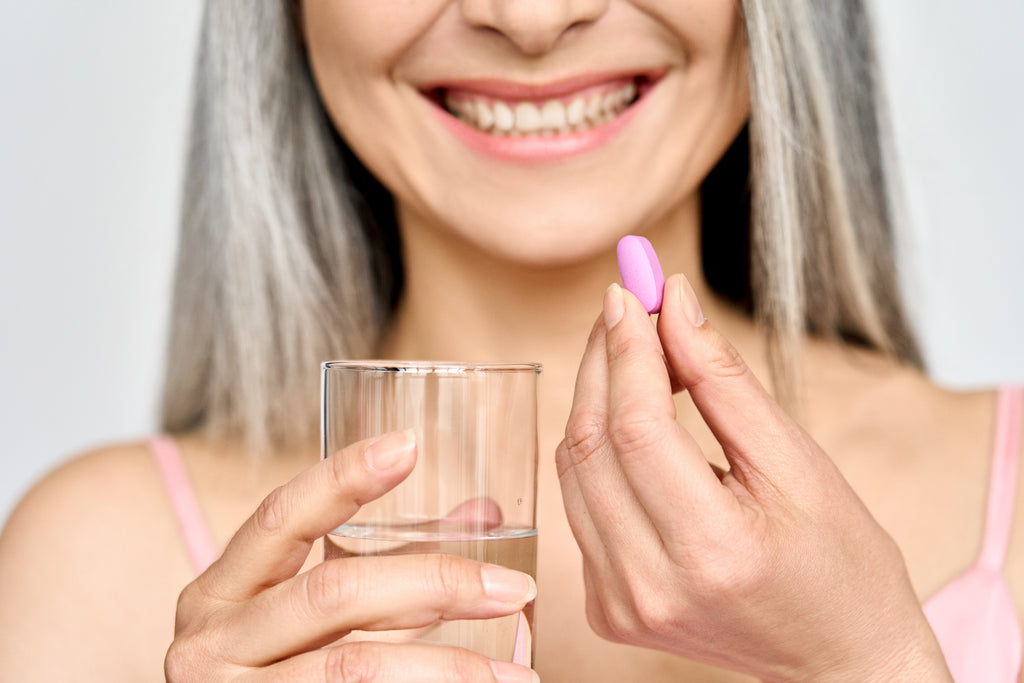
2. Liquid Collagen
Liquid collagen is one of the best forms of collagen to take due to its high bioavailability (meaning that it is easily absorbed by the body through your digestive system). Liquid collagen delivers a high concentration of hydrolyzed collagen peptides quickly and efficiently to your bloodstream. Plus, collagen liquid supplements are usually packaged in ready-to-drink formats, completely eliminating the need to mix a powder into water or other beverages.
Collagen drinks usually contain other nutrients that help support and protect your tissues. In the case of our Taut Premium Collagen Advanced Formula, ingredients such as hyaluronic acid and ceramides to deeply hydrate, nourish, and protect the outer layer of the skin. And, vitamin C, grape seed extract, vitamin B6, and salmon DNA, protect the skin from free radical damage, defend against premature aging effects, and restore beautiful looking skin.
3. Collagen Powder
So, what’s the scoop on collagen powder? Powdered collagen is one of the most popular and versatile forms available on the market today. Collagen powder can be either flavored or unflavored, which makes it easy to add to a blended smoothie, a cup of coffee, a bowl of bone broth, and other foods so you can get enough collagen to support your goals throughout the day.
While it’s known that liquid supplements are more effective than pills when it comes to bioavailability, collagen powder can be just as effective and have the same number of health benefits as long as it has a quick-dissolving formula.
Taut Collagen Powder has a unique formula that uses a Rapid Delivery System, or “RDS,” that allows the powder to dissolve instantly on your tongue. As a result, the collagen peptides bypass digestive processing, go directly into your bloodstream within minutes, and immediately start supporting your skin and connective tissues.
Each individual sachet contains 1.5 grams of marine hydrolyzed collagen (100% type I), 5 milligrams of hyaluronic acid, and 15 milligrams of grape seed extract, which is just enough collagen to give yourself a boost while you’re on the go. Simply tear open a sachet, add it to a glass of water or pour it directly into your mouth, and enjoy!
How Should You Take Taut Collagen Powder?
If you’re wondering, “how much collagen powder should I take to support healthy skin, healthy hair, and nail health?” We recommend going by your age. For people who are 20 years old or older, we recommend taking 2 sachets per day, which is equivalent to 3 grams of collagen per day. For people 35 years old or older, we recommend taking anywhere from 2 to 4 sachets per day which will give you up to 6 grams of collagen per day. Finally, for people over the age of 50, we recommend taking up to 10 sachets per day.
For maximum absorption and efficacy, we recommend taking this delicious, preservative-free, gluten-free, and sugar-free collagen powder on an empty stomach, either before eating or at least 2 hours after eating.
More helpful reading:
https://www.renewskinco.com/blogs/i/how-to-increase-collagen
Collagen Foods (& Other Foods that Support Collagen)
If you’re worried about how much collagen to take a day, one of the best ways to get started is by integrating more collagen rich foods into your healthy diet. The truth is, the average diet does not consist of enough collagen or collagen-boosting foods to fight off the typical signs of aging.
As we mentioned earlier, eating foods that are rich in complete proteins is one of the best ways to naturally increase collagen production. Foods that have been derived from animal sources such as chicken, fish, beef, and pork are at the top of the list, while other foods like dairy and soy also have a complete amino acid profile. Additionally, incorporating foods rich in collagen proteins such as bone broth, bone marrow, fish skin, chicken, and gelatin, can be the easiest way to up your collagen intake. Learn more about bone broth here.
While other foods like lentils, nuts, seeds, and whole grains contain protein, they do not have all nine essential amino acids that the body needs to synthesize collagen, making them incomplete sources of protein. 1
If you don’t eat food from animal sources, don’t despair. There are other foods that you can eat to help your body produce more collagen and protect your existing collagen from oxidative stress. In general, eating foods that are rich in nutrients such as vitamin C, zinc, and protein, Other nutrients that can support collagen naturally include omega-3 fatty acids, sulfur, and lycopene. 16
Some of the best foods that support collagen naturally and don’t come from animals sources include citrus fruits, tomatoes, berries, beans, leafy greens, and nuts and seeds.
But, before you start adding more collagen rich foods and other foods that support collagen synthesis to your diet, you should calculate how much protein your body needs every day to support adequate collagen production.
Experts recommend that most people eat at least the same number of grams of protein as their weight in pounds. This means that someone who weighs 150 pounds, should eat around 150 grams of protein per day.
Ms. Magnifique Transformation Program
At Taut, we believe that achieving your best skin starts from within. That’s why all of our products have been carefully formulated with the best ingredients from the highest-quality sources to prioritize your health, well-being, and beauty.
To provide you with all of the right products to achieve your most radiant self, we’ve put together our Ms. Magnifique Transformation Program which contains a selection of our most effective, synergistic products.
This skin-loving bundle comes with a 24-day supply of our Taut Premium Collagen Advanced Formula liquid collagen peptides to provide your skin with a daily dose of the building blocks it needs for a youthful, luminous complexion, 1 box of our Taut Bright Bye-Bye Dark Spots to eliminate dark spots and other skin imperfections, and 5 of our Taut Collagen Masks.
Each luxurious sheet mask is infused with hydrolyzed collagen peptides that have been broken down into nano-sized molecules, small enough to penetrate into your pores. The rich collagen essence also contains hyaluronic acid, botanical squalene, and vitamin C to hydrate, soften, and support the skin’s natural collagen synthesis process. Best of all, it only takes 20 minutes to turn your skin from dehydrated and dull to plump and luminous.
What are you waiting for? Find out for yourself how Ms. Magnifique can help you reclaim healthy, glowing skin in just 3 weeks.
Want to see what other Taut customers have to say about our collagen skincare programs? Read real reviews from our happy customers!
References
- https://health.clevelandclinic.org/do-i-need-to-worry-about-eating-complete-proteins/
- https://www.scientificamerican.com/article/why-does-skin-wrinkle-wit/
- https://www.ncbi.nlm.nih.gov/pmc/articles/PMC3583892/
- https://pubmed.ncbi.nlm.nih.gov/11966688/#:~:text=Conclusions%3A%20Smoking%20decreases%20the%20synthesis,extracellular%20matrix%20turnover%20in%20skin.
- https://pubmed.ncbi.nlm.nih.gov/9551072/
- https://www.skincancer.org/blog/photoaging-what-you-need-to-know/
- https://nbihealth.com/the-devastating-impact-of-stress-on-collagen/#:~:text=Chronic%20stress%20leads%20to%20chronically,damaging%20bones%2C%20joints%20and%20skin.
- https://www.ncbi.nlm.nih.gov/pmc/articles/PMC6356409/
- https://pubmed.ncbi.nlm.nih.gov/18416885/
- https://pubmed.ncbi.nlm.nih.gov/29337906/
- https://pubmed.ncbi.nlm.nih.gov/26353786/
- https://pubmed.ncbi.nlm.nih.gov/31010031/
- https://pubmed.ncbi.nlm.nih.gov/30783776/
- https://www.ncbi.nlm.nih.gov/pmc/articles/PMC6835901/
- https://pubmed.ncbi.nlm.nih.gov/23949208/
- https://health.clevelandclinic.org/the-best-way-you-can-get-more-collagen/
- https://pubmed.ncbi.nlm.nih.gov/28786550/#:~:text=Results%3A%20Bioactive%20collagen%20peptides%20treatment,improvement%204%20weeks%20post%2Dtreatment.


